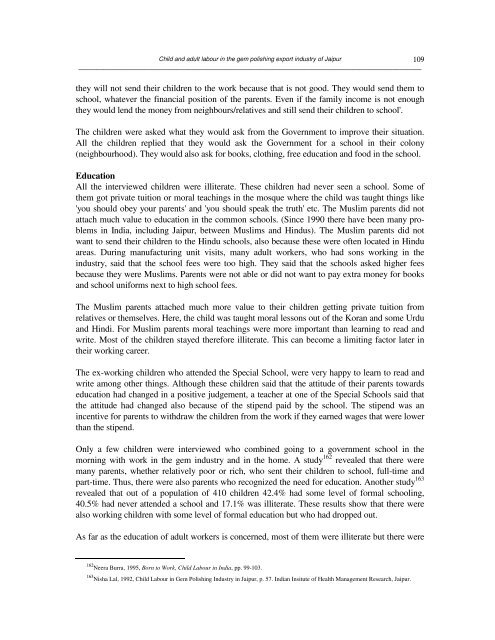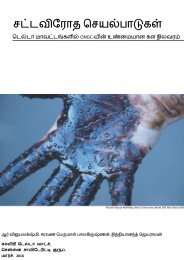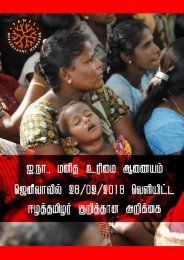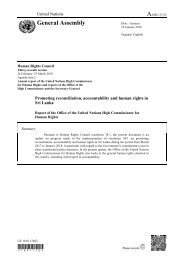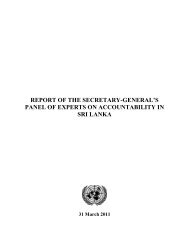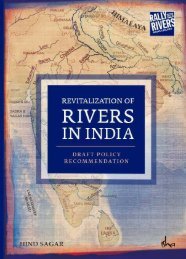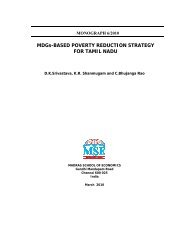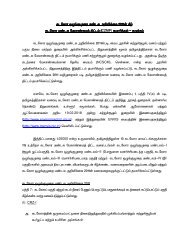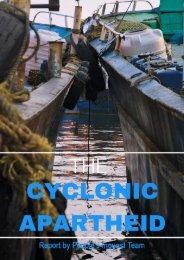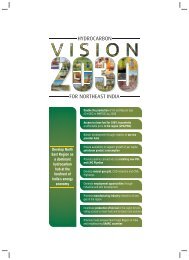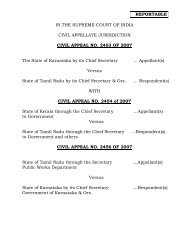You also want an ePaper? Increase the reach of your titles
YUMPU automatically turns print PDFs into web optimized ePapers that Google loves.
<strong>Child</strong> <strong>and</strong> <strong>adult</strong> <strong>labour</strong> <strong>in</strong> <strong>the</strong> <strong>gem</strong> polish<strong>in</strong>g <strong>export</strong> <strong>in</strong>dustry <strong>of</strong> Jaipur<br />
──────────────────────────────────────────────────────────────────────────────────────────────<br />
<strong>the</strong>y will not send <strong>the</strong>ir children to <strong>the</strong> work because that is not good. They would send <strong>the</strong>m to<br />
school, whatever <strong>the</strong> f<strong>in</strong>ancial position <strong>of</strong> <strong>the</strong> parents. Even if <strong>the</strong> family <strong>in</strong>come is not enough<br />
<strong>the</strong>y would lend <strong>the</strong> money from neighbours/relatives <strong>and</strong> still send <strong>the</strong>ir children to school'.<br />
The children were asked what <strong>the</strong>y would ask from <strong>the</strong> Government to improve <strong>the</strong>ir situation.<br />
All <strong>the</strong> children replied that <strong>the</strong>y would ask <strong>the</strong> Government for a school <strong>in</strong> <strong>the</strong>ir colony<br />
(neighbourhood). They would also ask for books, cloth<strong>in</strong>g, free education <strong>and</strong> food <strong>in</strong> <strong>the</strong> school.<br />
Education<br />
All <strong>the</strong> <strong>in</strong>terviewed children were illiterate. These children had never seen a school. Some <strong>of</strong><br />
<strong>the</strong>m got private tuition or moral teach<strong>in</strong>gs <strong>in</strong> <strong>the</strong> mosque where <strong>the</strong> child was taught th<strong>in</strong>gs like<br />
'you should obey your parents' <strong>and</strong> 'you should speak <strong>the</strong> truth' etc. The Muslim parents did not<br />
attach much value to education <strong>in</strong> <strong>the</strong> common schools. (S<strong>in</strong>ce 1990 <strong>the</strong>re have been many problems<br />
<strong>in</strong> <strong>India</strong>, <strong>in</strong>clud<strong>in</strong>g Jaipur, between Muslims <strong>and</strong> H<strong>in</strong>dus). The Muslim parents did not<br />
want to send <strong>the</strong>ir children to <strong>the</strong> H<strong>in</strong>du schools, also because <strong>the</strong>se were <strong>of</strong>ten located <strong>in</strong> H<strong>in</strong>du<br />
areas. Dur<strong>in</strong>g manufactur<strong>in</strong>g unit visits, many <strong>adult</strong> workers, who had sons work<strong>in</strong>g <strong>in</strong> <strong>the</strong><br />
<strong>in</strong>dustry, said that <strong>the</strong> school fees were too high. They said that <strong>the</strong> schools asked higher fees<br />
because <strong>the</strong>y were Muslims. Parents were not able or did not want to pay extra money for books<br />
<strong>and</strong> school uniforms next to high school fees.<br />
The Muslim parents attached much more value to <strong>the</strong>ir children gett<strong>in</strong>g private tuition from<br />
relatives or <strong>the</strong>mselves. Here, <strong>the</strong> child was taught moral lessons out <strong>of</strong> <strong>the</strong> Koran <strong>and</strong> some Urdu<br />
<strong>and</strong> H<strong>in</strong>di. For Muslim parents moral teach<strong>in</strong>gs were more important than learn<strong>in</strong>g to read <strong>and</strong><br />
write. Most <strong>of</strong> <strong>the</strong> children stayed <strong>the</strong>refore illiterate. This can become a limit<strong>in</strong>g factor later <strong>in</strong><br />
<strong>the</strong>ir work<strong>in</strong>g career.<br />
The ex-work<strong>in</strong>g children who attended <strong>the</strong> Special School, were very happy to learn to read <strong>and</strong><br />
write among o<strong>the</strong>r th<strong>in</strong>gs. Although <strong>the</strong>se children said that <strong>the</strong> attitude <strong>of</strong> <strong>the</strong>ir parents towards<br />
education had changed <strong>in</strong> a positive jud<strong>gem</strong>ent, a teacher at one <strong>of</strong> <strong>the</strong> Special Schools said that<br />
<strong>the</strong> attitude had changed also because <strong>of</strong> <strong>the</strong> stipend paid by <strong>the</strong> school. The stipend was an<br />
<strong>in</strong>centive for parents to withdraw <strong>the</strong> children from <strong>the</strong> work if <strong>the</strong>y earned wages that were lower<br />
than <strong>the</strong> stipend.<br />
Only a few children were <strong>in</strong>terviewed who comb<strong>in</strong>ed go<strong>in</strong>g to a government school <strong>in</strong> <strong>the</strong><br />
morn<strong>in</strong>g with work <strong>in</strong> <strong>the</strong> <strong>gem</strong> <strong>in</strong>dustry <strong>and</strong> <strong>in</strong> <strong>the</strong> home. A study 162 revealed that <strong>the</strong>re were<br />
many parents, whe<strong>the</strong>r relatively poor or rich, who sent <strong>the</strong>ir children to school, full-time <strong>and</strong><br />
part-time. Thus, <strong>the</strong>re were also parents who recognized <strong>the</strong> need for education. Ano<strong>the</strong>r study 163<br />
revealed that out <strong>of</strong> a population <strong>of</strong> 410 children 42.4% had some level <strong>of</strong> formal school<strong>in</strong>g,<br />
40.5% had never attended a school <strong>and</strong> 17.1% was illiterate. These results show that <strong>the</strong>re were<br />
also work<strong>in</strong>g children with some level <strong>of</strong> formal education but who had dropped out.<br />
As far as <strong>the</strong> education <strong>of</strong> <strong>adult</strong> workers is concerned, most <strong>of</strong> <strong>the</strong>m were illiterate but <strong>the</strong>re were<br />
109<br />
162 Neera Burra, 1995, Born to Work, <strong>Child</strong> Labour <strong>in</strong> <strong>India</strong>, pp. 99-103.<br />
163 Nisha Lal, 1992, <strong>Child</strong> Labour <strong>in</strong> Gem Polish<strong>in</strong>g Industry <strong>in</strong> Jaipur, p. 57. <strong>India</strong>n Insitute <strong>of</strong> Health Mana<strong>gem</strong>ent Research, Jaipur.


